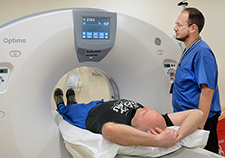Office of Research & Development |
 |

VA Research Currents archive
April 20, 2017
By Mitch Mirkin
VA Research Communications

Dr. JoAnn Kirchner (center) meets with QUERI team members (from left) Dr. Mona Ritchie, co-implementation research coordinator; Krissi Morris, program coordinator; Dr. Mark Bauer (via computer), lead investigator in Boston; Mark Bowman, research assistant; and Jeffery Pitcock, data coordinator. Not shown is team member Jeffrey Smith, implementation research coordinator. (Photo by Jeff Bowen)
"How's your blood pressure doing today?"
That's probably not a question you'll be asked at your next doctor visit. Instead, you'll have a cuff strapped on your arm and get a formal reading—a number (or, actually a pair of numbers) that you and your provider can use to understand exactly where you stand, and whether you need treatment.
Now imagine a world where this approach applies in mental health care, as well. In other words, you'd fill out a brief validated questionnaire each visit and get a number, or score, for your depression, or PTSD, or whatever condition you're coping with.
Dr. JoAnn Kirchner can indeed envision such a world. The longtime VA psychiatrist and researcher, based in Little Rock, Arkansas, co-leads VA's QUERI for Team-Based Behavioral Health. One of the goals is to expand the use of measurement in VA mental health care.
"It's not just obtaining a measure from the patient," says Kirchner. "Rather, it's about taking the patient-reported measures and using them to involve the patient in the treatment-planning process."
QUERI stands for Quality Enhancement Research Initiative. Begun in 1998, QUERI today encompasses a national network of programs designed to translate research findings into everyday care at VA medical centers and clinics. Integral to the effort are close partnerships among researchers, clinicians, and program offices in VA headquarters in Washington, D.C.
Kirchner's team, as one of 15 QUERI programs, is probing a number of areas related to team-based mental health care. One is tele-mentalhealth—delivering psychotherapy to Veterans with behavioral health problems in their homes and in VA community-based outpatient clinics. Among other tools, the group developed and field-tested a planning checklist that is now being used by VA to expand telehealth to Veterans in rural and other underserved areas.
"QUERI is focused on taking those evidence-based practices and tools and learning how to get them into the hands of practitioners."
The main focus now for Kirchner's QUERI is exploring how care teams communicate with each other, with an eye toward avoiding redundancy and streamlining processes. The team wants to map out best practices that can be deployed in freestanding VA mental health clinics, as well as those clinics that combine primary and mental health care.
"When you move toward team-based care, you work together and communicate together about the patient, and you pull information from multiple sources," explains Kirchner. "That benefits the patient in at least two ways. First, they don't have to tell their story again and again and again. Second, I as the psychiatrist may not be the specialist on what that person needs, but the social worker on our team may be that specialist. And they will do a lot better job of ascertaining where we need to focus the team's energy."

The measurement piece complements that research, as part of the larger QUERI. The idea might seem simple—have the patient complete some type of quantitative assessment at each and every visit, to provide a score that can be tracked over time. But it is far from the norm in mental health clinics.
The government may be ahead of the curve on this one.
"I would say that outside of VA and DoD [the Department of Defense], measurement-based mental health care is rare," notes Kirchner. The exception, she says, might be at baseline, or a first visit, when the patient is assessed to determine what disorders are present. But even then, many practitioners in the private sector will do an assessment without any type of validated instrument, or survey.
She says DoD and VA are leading the country in assessing the use of measurement-based care in mental health care, and then working to implement it on a wide scale.
"Traditionally, mental health care in general has not been grounded in comprehensive measurement of outcomes," she says. "But there is a national initiative, with the VA Office of Mental Health Operations and Mental Health Services, as well as one of our QUERI projects that is complementary to that initiative, to incorporate measured outcomes across time, and to use them to inform care decisions with the provider and the patient."
Kirchner explains how the process works in mental health clinics that don't emphasize measurement, for a typical patient complaining of feeling sad:
"Quite possibly you would go through a process to determine the degree to which you meet the criteria for a depression disorder, and the provider would determine yes or no, you meet or don't meet the criteria for depression. Let's say you do, and I prescribe a medication, and I say I want to see you back in two weeks and see how you're doing. And I would tell you to call me if you have problems or side effects, or concerns about wanting to hurt yourself.
"You come back in, and I would probably ask you a few questions like, How's your energy level? How's your attention and concentration? How are you sleeping? Have you been able to feel joy or happiness? And I would get a general sense of how you are doing."
She contrasts that with a clinic that uses measurement throughout the care process:
"On the initial visit, I would have documented your condition using a depression inventory, or instrument, and we'd have a baseline number. Then, on that return visit, as you were sitting in my office, we'd go down a set of questions and you would rate yourself and you would again get a number. Then I could compare that to the number you had two weeks ago. And you and I could sit down and look together to see whether you're getting better."
A drop in the score might lead to changes to the care plan.
Kirchner: "I might say, How about us going up on that medication dose, and let's see if we get any change at all. Or perhaps we would look at changing the medication. And we would look at what's going on in your life. It's got to stay Veteran-centric. It's working with the patient to make care decisions, based on measured outcomes that the patient knows as well as the provider."
She emphasizes that her research team is not looking to develop new instruments to measure patients' symptoms and progress. They are relying on tried and true ones. One, for example, is the Patient Health Questionnaire, or PHQ-9. It has nine items for which the patient rates himself from "not at all" to "nearly every day," with a couple of choices in between.
"We're using current evidence-based treatments," emphasizes Kirchner. "QUERI is focused on taking those evidence-based practices and tools and learning how to get them into the hands of practitioners."
PTSD and depression, along with substance use disorders, are areas where VA has made progress in recent years in terms of screening—identifying those Veterans who are affected, when they first encounter the health care system, and working to get them into treatment. There's still room for improvement in terms of making sure screening is uniformly done at all VA care sites nationwide. But along with that, now, comes the emphasis on continued measurement of patients' progress.
"What we're beginning to do now is that repeated measure, which is so essential to making care decisions, and sharing it with the patient," says Kirchner.
She is optimistic this will become the norm in VA mental health care within the next few years. Asked what drives the optimism, she cites the nature of QUERI—how tightly the research is aligned with VA's top strategic goals, and how closely QUERI investigators work with those who actually plan and deliver the care Veterans receive.
"I don't think these are just sugar plums that dance in your head," says Kirchner. "These can be realities because of how highly partnered we are."